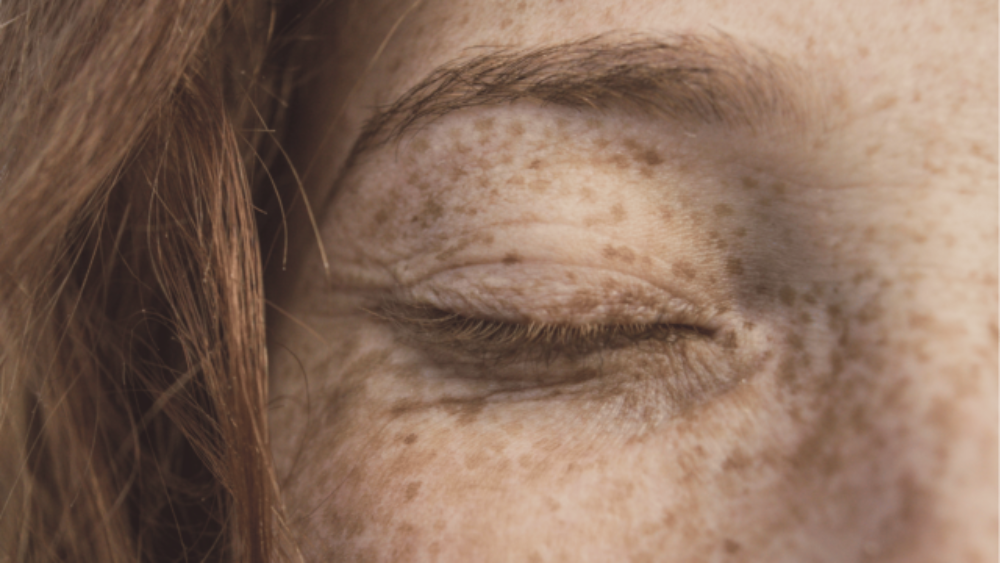Dear KAMI skincare friends,
Skin care is more than just applying oils, creams, and serums. Our skin is also a reflection of our inner state. Especially with skin conditions like atopic dermatitis, genetics aren't the only factor. This demonstrates the close interplay between mental health and skin health. Stress, negative thoughts, and a lack of self-love can exacerbate skin problems. But how exactly does mental stability affect our skin, and what can we do to support it? Currently, in time for Valentine's Day, KAMI skincare founder and general practitioner Dr. Kerstin Schallaböck summarizes how atopic dermatitis flare-ups can be influenced mentally.
What connections are evident and are they proven?
1. Neurodermatitis and the influence of stress
Atopic dermatitis, also known as neurodermatitis, is a chronic skin condition characterized by dry, itchy, and inflamed patches of skin. It affects millions of people worldwide and poses not only a physical but also a psychological challenge. The vicious cycle often begins with external stress: Psychologically demanding situations or stressful events can lead to an acute flare-up in people with neurodermatitis. But why is this?
The answer lies in the way our body reacts to pressure or tension. In stressful situations, the stress hormone cortisol is released, which can intensify inflammatory processes in the body. In people with atopic dermatitis, this hormone can further damage the skin barrier and increase inflammation. A study in the "Journal of Investigative Dermatology" shows that psychological stress is one of the main causes of worsening symptoms in atopic dermatitis. This is also reflected in our current study with atopic dermatitis patients.
2. Self-love and self-acceptance as the key to soothing the skin
Mental stability is crucial for minimizing the effects of stress on the body, especially on the skin. This is where the concept of self-love and self-acceptance comes into play. People who accept themselves and treat themselves with love have a lower stress response to stressful events. A study published in the journal Psychoneuroendocrinology has shown that people with higher levels of self-acceptance produce fewer stress hormones like cortisol and therefore also experience fewer skin problems.
Self-love means accepting yourself with all your quirks and challenges, such as a chronic skin condition. With atopic dermatitis, it can be especially difficult to love yourself when you're constantly battling visible skin irritations and discomfort. But that's precisely when it's important to practice patience and mindfulness with yourself and to view your skin not as a "flaw" or "disorder," but as a part of your unique body. Acceptance is the first step to calming yourself and thus relaxing your skin (and your soul).
3. Self-Care: How to care for your skin inside and out
Self-care isn't just a fad—it's a crucial component of skin health. It's about nurturing both your mental and physical health. If you're struggling with eczema, it's important to develop a holistic self-care regimen that addresses both your body and mind.
- Maintain a stress-free environment: Part of the self-care approach for atopic dermatitis is identifying and minimizing the sources of stress in your life. Regular meditation, breathing exercises, exercise, and yoga can help calm the nervous system and reduce cortisol production. Conscious body care, including conscious moisturizing and moisturizing, for example, with our delicate KAMI 2-Phase Spray, can also bring balance to the soul.
- Nutrition: Studies show that a balanced, anti-inflammatory diet can positively influence the symptoms of atopic dermatitis. Foods such as omega-3 fatty acids, antioxidants, and probiotics support the body in fighting inflammation.
- Topical care: Your skincare routine should be tailored to your skin's condition. For atopic dermatitis, it's crucial to choose products that soothe the skin, strengthen the skin barrier, and reduce inflammation. KAMI skincare products contain skin-soothing oils, shea butter, and aloe vera, all of which promote the development of a healthy skin barrier. Lavender oil and Tanais Annuelle oil also support this. Their scent is soothing, grounding, and creates a sense of calm, which has a positive effect on the skin's appearance. It's also important to avoid skincare products that could irritate the skin, such as those containing alcohol, mineral oils, or artificial fragrances.
Scientific studies confirm the connection
Scientific studies confirm that a positive mental attitude and stress management strategies have a measurable impact on the progression of skin conditions such as atopic dermatitis. A 2019 study published in the British Journal of Dermatology showed that psychological interventions such as cognitive behavioral therapy (CBT) and mindfulness training can significantly improve the progression of atopic dermatitis. These therapeutic approaches help reduce psychological stress factors, promote skin health, and improve patients' quality of life.
To sum up: YOU can support your path to healthy skin!
The connection between mental stability and skin health is undeniable. Self-love, self-acceptance, and a mindful self-care routine are crucial not only for your mental well-being, but also for your skin. Especially with chronic conditions like atopic dermatitis, it's important to take an approach that considers both the physical and mental aspects. When you're in tune with your mind, your skin will feel better—not just externally, but also internally.
I hope I've given you a few reasons to accept and pamper yourself today on Valentine's Day.
Celebrate yourself!
All love
Your Kerstin








